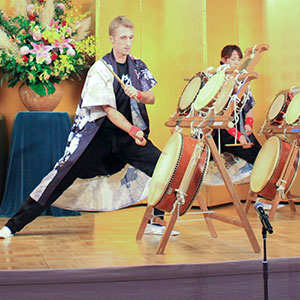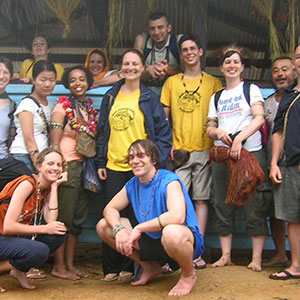Now in its 30th year, the Japan Exchange and Teaching (JET) Programme has welcomed more than 62,000 people from 65 countries to deliver grassroots international exchange between Japan and other nations. This column features former JET Programme participants who keep the idea of fostering mutual understanding firmly at heart.
I applied to be an assistant language teacher on the Japan Exchange and Teaching (JET) Programme because a friend did. I knew nothing about the culture or language, other than what I had learnt preparing for my interview.
During my first month in Japan, I stood on my tatami matting in my unfurnished apartment and realised that I was not just surviving in this unknown territory of a new job, home, language, friends and country, but enjoying it.
Spending 1999 working in the town of Makuhari, Chiba Prefecture, shaped my future. For it was then that I developed the ability to be comfortable with the unknown and the determination to be understood, traits that are so important for an entrepreneur.
I’m often told that my facial expressions are easy to read. I believe that comes from my experience communicating gratitude, enthusiasm and other emotions through facial expressions rather than Japanese—a language I could not speak during my first few months in Japan.
As my new world changed from being exhilaratingly scary to highly intriguing, I created a routine. It included Japanese lessons, taiko drumming class, Japanese painting classes and being a volunteer leader with the local group of Brownies, part of the World Association of Girl Guides and Girl Scouts.
In reality, it was like being a Brownie again, because my limited language skills meant I couldn’t teach activities or answer questions. Instead, the Brownies taught me origami, how to cook Japanese food and the name of every insect a seven-year-old should know.
The generosity and openness of the Japanese people left an incredible impression on me.
When I returned to the UK, I started work in London. I volunteered on JET Programme interviews, during which I would answer applicants’ questions about Japanese culture and lifestyle. This proved the perfect role for me because I couldn’t stop telling everyone how great Japan is.
This experience led to the opportunity to meet Junichiro Koizumi, then-prime minister, while he was on a visit to London, in 2002, to talk about the role that programme participants have as ambassadors of Japan.
In 2004, I launched my own business, with a vision to create a sustainable event industry by enabling every meeting, festival or sporting event to have a positive environmental and social impact.
This led me to the International Organization for Standardization (ISO), the world’s largest developer of voluntary international standards, for which I chaired a management standard ISO 20121 committee.
The creation of ISO 20121 involved more than 30 countries, including Japan, and was inspired by the London 2012 Olympic and Paralympic Games. An ISO representative said he had never known such an active contribution from a Japan delegation.
I hope that by constantly exchanging aisatsu (greetings) with the Japanese delegates, I helped break down communication barriers that can have an impact on the success of delegates’ interactions. Perhaps my enthusiasm to communicate, even with limited language skills, gave the Japanese delegates confidence to speak English. My cultural understanding of Japan—that only the experience of living in the country can bring—was also helpful.
A few months ago I was in Japan to visit a chapter of Meeting Professionals International, a membership organisation for professional meeting planners, of which I am international chair in 2016.
During my stay, I also worked with a team who are providing workshops to help Japan become a leading sustainable event destination in the lead-up to the Tokyo 2020 Olympic and Paralympic Games.
The JET Programme really delivers on the lifelong cultural connection it promises to its wide-eyed new arrivals. I don’t know if former participants or the Japanese community will ever know the extent of the impact they have on each other, but it is a privilege to have experienced such a special relationship first hand.







